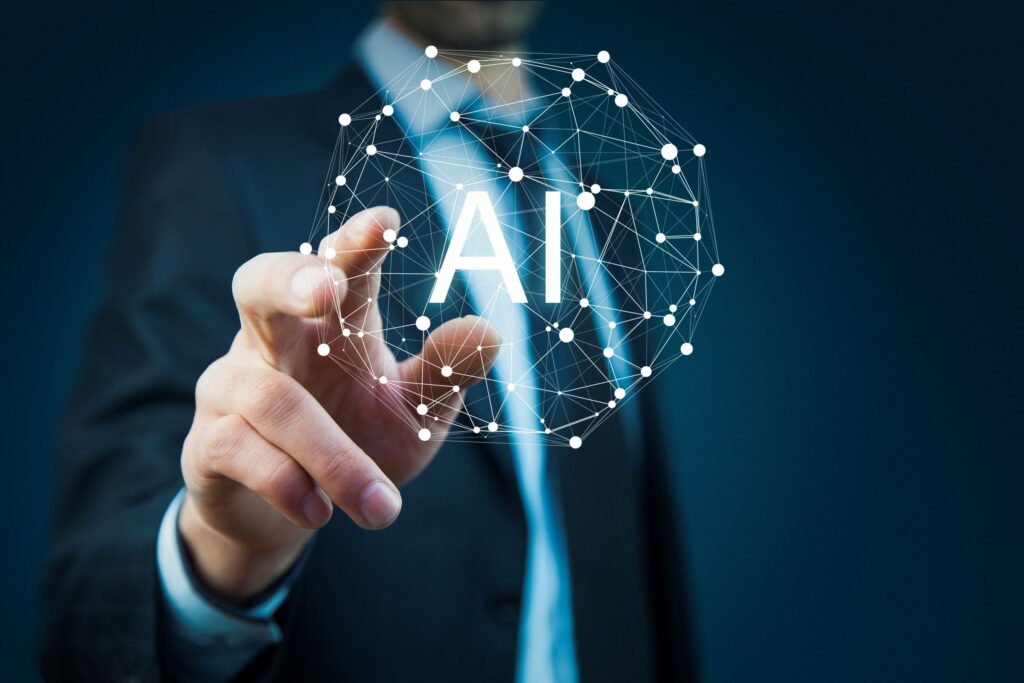Artificial intelligence (AI) is no longer a futuristic concept; it’s a present-day reality rapidly transforming traditional business operations across all sectors. From automating routine tasks to providing data-driven insights, AI is reshaping how businesses operate, compete, and serve their customers.
Let’s explore the impact of AI and automation on key business functions, explore the associated pros and cons, and offer a projection of the business landscape around 2030.

The Impact of AI and Automation on Key Business Functions:
AI and automation impact virtually every aspect of traditional business, shaking things up for businesses and touching many areas. In marketing, think of super-targeted ads, figuring out which leads are gold, and those handy chatbots answering questions around the clock.
For manufacturing, robots are taking over the boring stuff, boosting output, and cutting down on expenses. Plus, they’re making things safer and helping keep supplies flowing smoothly.
Finance is also getting a makeover. AI is speeding up things like invoices, sniffing out fraud, and making market predictions. Smart algorithms are diving into data, finding patterns, and helping teams make smarter calls.
HR is also getting some AI love. It’s helping with hiring, getting new folks settled, and making training more personal. These tools look at employee info and spot areas where people might need a boost.
And customer service? AI chatbots and virtual helpers are available 24/7 to help solve issues and keep customers happy.
Pros and Cons of AI in Traditional Business:
While AI offers numerous benefits, it’s essential to consider both the advantages and disadvantages.
Pros:
AI can enhance businesses in many ways. It can automate tasks to reduce human error and costs, improve and personalize customer service, and optimize decision-making using data-driven insights. Furthermore, AI presents opportunities for innovation by streamlining business processes.
Cons:
Automation may lead to job losses in many sectors, requiring workforce retraining and adaptation. Implementing AI solutions can be expensive, requiring significant investments in technology and expertise. AI systems rely on vast amounts of data, raising concerns about data security and privacy.
AI raises ethical questions about bias, fairness, and accountability. While AI can automate many tasks, it may lack the human touch and empathy required for specific interactions that require a more humane touch.
AI and Business Operations in 2030:
In 2030, AI will be more deeply integrated into traditional business operations. Here’s a projection of what the landscape might look like:
Think retail, healthcare, you name it. We’re talking robots or software handling all the boring stuff, freeing people to be creative and think big. It’s gonna be like humans and AI teaming up, where the AI makes us even better and more efficient.
Customers are going to get a crazy personalized experience too. AI will figure out what they want before they know it, offering them precisely what they need. And for the business side, AI will be crunching all the numbers and helping make smart decisions about everything – pricing, marketing, what to build next, you get the idea.
But, with all this cool AI stuff, we’ve got to make sure it’s fair and that we’re using it right—no funny business. Companies had better stay on their toes, keep training their people, and be ready to change things up fast, or they’d get left behind.

Key Business Impacts by 2030:
AI is set to seriously boost efficiency and productivity by streamlining how everything works across all departments.
Companies can make smarter strategic calls using AI analytics that uncover key insights into market trends, customer habits, and how things are running internally.
AI also helps businesses provide super personalized experiences, building stronger relationships and customer loyalty.
AI fuels innovation, leading to new business approaches and income opportunities.
With all these AI improvements, businesses must develop an adaptable, tech-friendly team that can work well with AI systems.
Concluding Thoughts:
The future of traditional business is inextricably linked to AI. By embracing AI and strategically integrating it into their operations, businesses can unlock new efficiency, productivity, and innovation levels. While challenges remain, the potential benefits of AI are undeniable.
As we approach 2030, businesses that proactively adapt to the AI revolution will be best positioned to thrive in the increasingly competitive landscape.
Ready to navigate the AI revolution and transform your business for the future? Schedule a consultation call today to discuss how our coaching and consulting services can help you develop a strategic AI roadmap and achieve your business goals.



